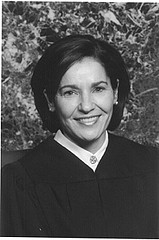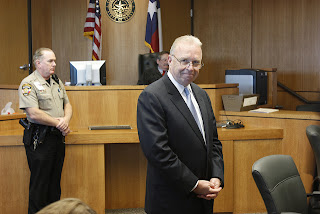 In Texas it is apparently ok for a Republican judge to say that they are “pro prosecution”, as Judge Sharon Keller has done, and not have to recuse herself from any cases, but if a Democratic judge expresses any doubts about the constitutionality of the death penalty, then she must recuse herself. If Teresa Hawthorne must recuse herself from the current death penalty case because of “bias”, then Judge Sharon Keller should recuse herself from all cases before her court.
In Texas it is apparently ok for a Republican judge to say that they are “pro prosecution”, as Judge Sharon Keller has done, and not have to recuse herself from any cases, but if a Democratic judge expresses any doubts about the constitutionality of the death penalty, then she must recuse herself. If Teresa Hawthorne must recuse herself from the current death penalty case because of “bias”, then Judge Sharon Keller should recuse herself from all cases before her court.
Prosecutors, with the help of a judge appointed by Rick Perry, may have been successful today in forcing Judge Hawthorne to recuse herself (just as other prosecutors were successful in shutting down the 2010 hearing in Judge Charlie Baird’s court on the Todd Willingham case), but as we said in an earlier post “these type of rulings are likely to continue as more and more judges reach the same conclusion. One day, we expect it will be the U.S. Supreme Court that will rule the death penalty unconstitutional, but until then we are happy to see lower level courts build momentum towards the day when the death penalty will be rejected by the U.S. Supreme Court.”
Teresa Hawthorne, the Dallas County judge who ruled that the state’s death penalty statute was unconstitutional, must recuse herself from a capital murder case, a judge ruled today.
and
Assistant District Attorney David Alex argued that Hawthorne’s bias against the death penalty was clear from statements she made during a December 19 pre-trial hearing. He quoted, in bits and pieces, things the judge said in open court that day, such as: “I remember when women and blacks could not vote. I remember when so-called witches were burned. I remember when gays had to hide to be in the military.” Hawthorne said then she wasn’t trying to engage in judicial activism; she insisted last month that she was not trying to “buck the system or stir the waters.” Alex vehemently disagreed.
“The judge analogized the death penalty to some very heinous times in our American history,” Alex told the court. It’s obvious, he said, that she has “very strong emotional, personal feelings against the death penalty. … But none of these things have anything to do with legal precedent.”








 The Bureau of Justice Statistics issued
The Bureau of Justice Statistics issued  Another judge in Texas has ruled that the Texas death penalty is unconstitutional. This is the second time in less than two years that a judge in Texas has made such a ruling. In 2010, Judge Kevin Fine ruled the Texas death penalty was unconstitutional and then later had to withdraw the ruling. There will be a hearing in January 2012 on the ruling by Judge Teresa Hawthorne in Dallas. Texas Moratorium Network is making tentative plans to be at the hearing, just as we attended the hearing in Houston in December 2010. These type of rulings are likely to continue as more and more judges reach the same conclusion. One day, we expect it will be the U.S. Supreme Court that will rule the death penalty unconstitutional, but until then we are happy to see lower level courts build momentum towards the day when the death penalty will be rejected by the U.S. Supreme Court.
Another judge in Texas has ruled that the Texas death penalty is unconstitutional. This is the second time in less than two years that a judge in Texas has made such a ruling. In 2010, Judge Kevin Fine ruled the Texas death penalty was unconstitutional and then later had to withdraw the ruling. There will be a hearing in January 2012 on the ruling by Judge Teresa Hawthorne in Dallas. Texas Moratorium Network is making tentative plans to be at the hearing, just as we attended the hearing in Houston in December 2010. These type of rulings are likely to continue as more and more judges reach the same conclusion. One day, we expect it will be the U.S. Supreme Court that will rule the death penalty unconstitutional, but until then we are happy to see lower level courts build momentum towards the day when the death penalty will be rejected by the U.S. Supreme Court.



